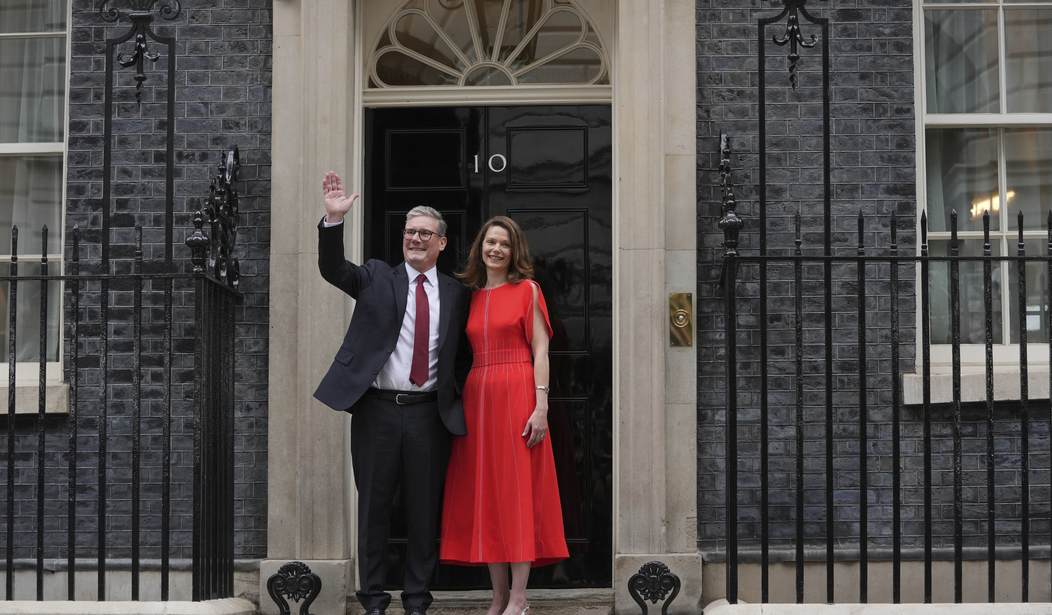Last week -- on July 4th, of all days -- Britons went to the polls and tossed out the Conservative government, as expected. After wielding control for 14 years, the Tories had grown profoundly dysfunctional, politically sclerotic, and ideologically lost. They were ferociously opposed by the Left, of course, but ordinary voters had grown weary of their drama and failures, and their own base was irate over a prevailing sense of betrayal. That is a toxic combination, especially under the UK's parliamentary system. The resulting electoral verdict was a rout of historic proportions, with the Labour Party sweeping into power, earning one of the largest majorities ever. On the surface, it was an extremely bleak night for the Right, but there were also several prominent red flags lurking in the results for the new leftist government. Polling had expected a much higher overall vote share for Labour, and some suggested the Conservatives could be demolished so badly that they'd hold only dozens of seats when all was said and done -- well short of 100 (out of 650 in the House of Commons).
What actually transpired was a big miss for Labour on national vote share, vis-a-vis the polling, and the Tories hung onto more seats (a still-terrible 121) than some of the more dire data had projected:
Labour's vote share - 34% - was lower than any opinion poll.
— Fraser Nelson (@FraserNelson) July 5, 2024
Graphs now on the Spectator data hub: https://t.co/2uVOUSxQti pic.twitter.com/HPELWrINmh
Far from an enthusiastic embrace of Labour, this was one of the party's worst vote shares in decades, despite the overwhelming number of seats won under the country's 'first-past-the-post' model:
Starmer's Potemkin landslide: my take on the PM with a huge majority - but lowest vote share in modern times https://t.co/kEQbTKNSEO
— Fraser Nelson (@FraserNelson) July 5, 2024
LABOUR'S POPULAR VOTE PER ELECTION SINCE 1997
— Nassreddin | نصر الدين (@Nassreddin2002) July 4, 2024
1997 - 43%
2001 - 41%
2005 - 35%
2010 - 29%
2015 - 30%
2017 - 40%
2019 - 32%
2024... 35-36%
So... 14 years of opposition led to just +5/+6 ?
A huge element of this wipeout was the right-populist 'Reform' Party, fronted by Nigel Farage (who was elected as an MP) draining millions of votes from the typical Tory base. These voters were rightly angry, and Reform gave them somewhere to land, as an unambiguous warning for the Conservatives. As a result, the fractured center-Right parties splintered that vote, allowing Labour to run up the score. This is an interesting statistic:
.@DanielJHannan: “Reform won five seats, but cost the Tories more than 100. The two Rightist parties together got 10.6 million votes and 126 MPs; Labour got 9.7 million votes and 411 MPs.” https://t.co/kaprdHLOJM
— Michael R. Strain (@MichaelRStrain) July 6, 2024
The Tory + Reform vote surpassed Labour's vote total by nearly one million, but Labour took home more than 400 seats. Daniel Hannan is brilliant, but I'd also suggest it may be a bit unfair to say that Reform "cost" the Tories 100 or more seats, even though that's obviously true in an important sense. An overriding reason why Reform was in a position to play the spoiler on such a grand scale is that the Tories cost themselves those voters by ignoring and betraying them, especially on issues like immigration. If Reform continues to cannibalize and split the center-Right vote in the future, and if the Tories don't get their house in order and actually stand for something again, that would certainly be welcome news for Labour in the future. But only about one-third of British voters pulled the lever for Labour, even after nearly a decade-and-a-half of Tory rule. Labour hardly looks invulnerable at the outset of their new government. Also, consider this note on electoral systems and 'democracy:'
Recommended
People criticize our electoral system, which has its flaws — but so does every other democratic system, especially as far as “democracy” goes.
— Guy Benson (@guypbenson) July 5, 2024
The third place party won 14% of all votes in the UK yesterday (one day of voting, quick results!), translating into FOUR seats. The… pic.twitter.com/X36fY6pwkl
The third place party won 14% of all votes in the UK yesterday (one day of voting, quick results!), translating into FOUR seats. The fourth place party won 12% of all votes, translating into SEVENTY-ONE seats. Labour won a little more than 1/3 of the total vote and will command one of the largest majorities (of seats) ever. The center-right splintered over Tory failures into two major parties (one brand new), combining for ~38% percent of the vote.
Reform's nearly 4.1 million votes tranlated into four seats. The Liberal Democrats' nearly 3.5 million votes translated into 72 seats (after the dust settled). Even wilder, Sinn Fein in Northern Ireland attracted 210,000 votes, total, and took home seven seats because those votes were concentrated in certain districts, as opposed to spread out across all of the United Kingdom. I'm not attacking their system, but I haven't seen much whining from the Left about how "unrepresentative" or "un-democratic" these results were, likely because the Left won big under the system in place. People who live in nations with parliamentary systems often marvel at how bizarre our electoral college set-up is, but is it any crazier than the wild imbalances illustrated above?
I'll leave you with this: In the UK, the overwhelming majority of voters vote in-person on election day. There is no 'election month.' Mail-in ballots must be applied for. Photo ID is required to vote. Only British citizens can vote (ahem). And tens of millions of ballots were tabulated and reported in a matter of hours, with the results accepted as prompt and clear. I suppose you could argue there are some appealing elements of their system, after all.

























